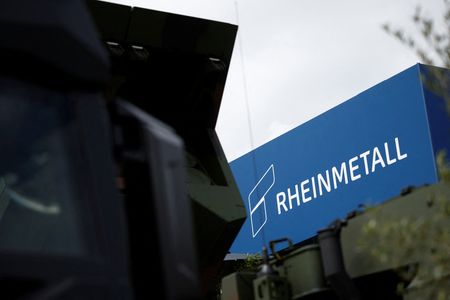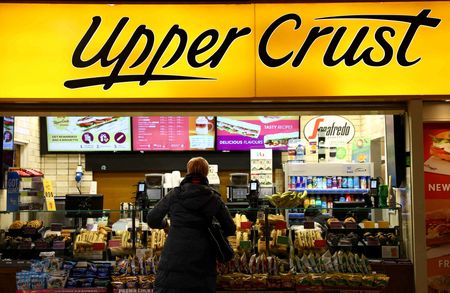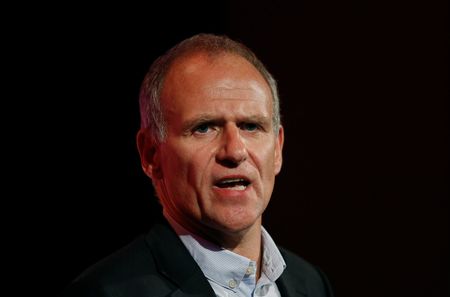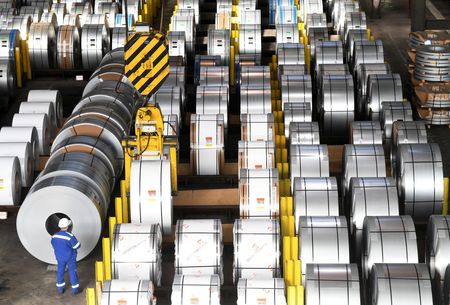By Christoph Steitz and Matthias Inverardi
FRANKFURT/DUESSELDORF (Reuters) -Rheinmetall, Europe’s top ammunition maker, intends to repurpose two of its automotive plants in Germany to mostly make defence equipment, highlighting the impact of an expected surge in spending in the region amid U.S. tensions over the Ukraine war.
Europe’s political leaders, sidelined in U.S.-Russia talks over Ukraine, came together at last week’s Munich Security Conference that served as a wake-up call for the EU to come up with its own sustainable defence plan.
Rheinmetall’s defence expansion affects its factories in Berlin and Neuss, where the company currently makes automotive parts, a business that has faced challenges as Germany’s carmakers battle high costs and competition from abroad.
Under the plans, which still need to be finalised, both factories would become part of Rheinmetall’s Weapon and Ammunition division and serve as so-called hybrid plants, ensuring some automotive production can still take place.
“Above all, the plants will benefit from the industrial strength that the Rheinmetall Group has as a major military equipment supplier, as well as from the high demand from customers in Germany and worldwide,” the group told Reuters in e-mailed comments.
The company said no final decisions had been made regarding the new structure. It also said no explosives would be processed at the sites but they would produce protection and mechanical components for military use.
Shares of European weapon makers have surged in expectation of the spending boom after U.S. President Donald Trump said Europe would need to step up investment in military resources.
The STOXX aerospace and defence index hit record highs last week as investors bet the region’s governments will have to spend more on weapons and military equipment as the U.S. prepares to step back.
This could also give German manufacturing a boost at a time when traditionally strong sectors, most notably automakers including Volkswagen, are cutting capacity and thousands of jobs.
The country’s weak economy was a major grievance among voters in Germany’s elections over the weekend.
RETOOLING
Rheinmetall’s action marks the second time within a month that a defence company has unveiled plans to convert existing manufacturing capacity, after defence group KNDS agreed to take over a plant in eastern Germany from French trainmaker Alstom.
KNDS, 50-50 owned by Germany’s Wegmann & Co GmbH and the French state, plans to make military equipment at the site, including the LEOPARD 2 battle tank and the PUMA infantry fighting vehicle.
Rheinmetall’s market value has soared since Russia’s invasion of Ukraine. It was elevated to Germany’s blue-chip DAX 30 two years ago and is now worth about 39 billion euros ($40.8 billion), based on LSEG data, almost double its value before Trump was elected.
DEFENCE SPENDING
Defence spending needs to rise as last year only 23 of NATO’s 32 member countries met a target to spend 2% of national output on defence.
“It is not difficult to see why hundreds of billions of euros of additional spending may be required over the rest of this decade,” analysts at Deutsche Bank said.
Deutsche Bank’s economists calculated that correcting 10 years of underspending by NATO members to reach the 2% target would cost about 800 billion euros.
Trump has called on NATO members to increase spending to 5% of GDP.
The Deutsche Bank analysts also said that of the around 200 billion euros spent by Europe on defence equipment since 2022, only 40 billion went to EU defence providers.
There is also increased appetite from investors for defence-related assets, with Thyssenkrupp preparing a spin-off of its warship division TKMS, while KNDS is exploring a stock market listing as soon as the end of 2025.
“We are well prepared and we don’t need to be shy – action must be taken now for security in Europe,” Rheinmetall CEO Armin Papperger had told Reuters earlier this month, adding that the company expected to grow even faster than previously thought.
Rheinmetall’s operating profit at its weapon and ammunition business nearly doubled to 339 million euros over the first nine months of 2024, while profits at its automotive division fell 3.8% to 74 million, it said in November.
The expected boom in defence spending could also benefit Rheinmetall’s rivals, including Hensoldt and Renk.
($1 = 0.9558 euros)
(Reporting by Christoph Steitz and Matthias Inverardi; Editing by Josephine Mason, Jane Merriman and Rachel More)









